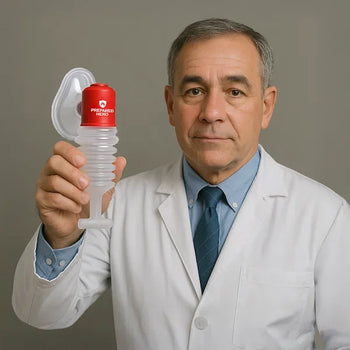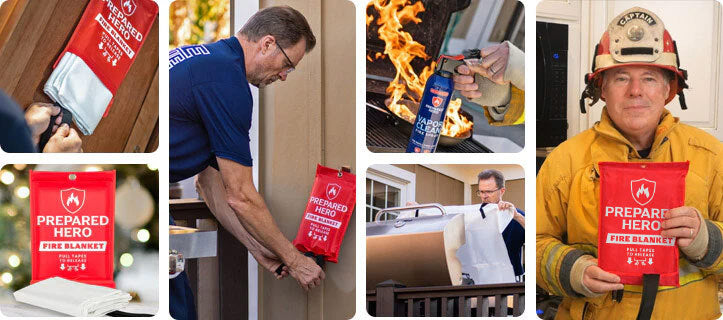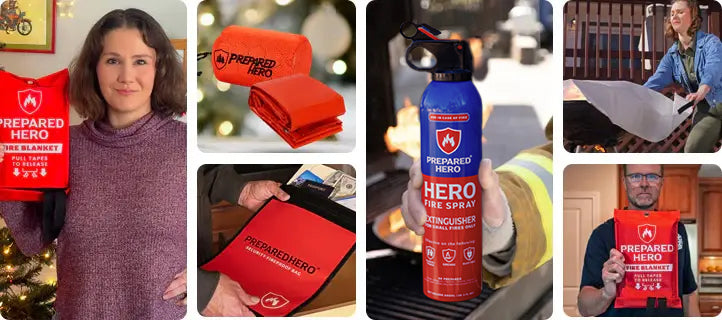Where you put your smoke detectors matters just as much as installing them. Proper placement makes sure they can detect...
Gas leaks are more common than people think, and they can be dangerous if not handled properly. Even a small leak can lead to health problems, fires, and explosions. For these reasons, you should know how to spot the signs, what to do if there’s a leak, and how to prevent one in the first place.
In this guide, we’ll walk through the signs, safety steps, long-term effects, and prevention of gas leaks to keep your home safe.
Can You Stay In a Home With a Gas Leak?

No, you can’t stay at home with a gas leak. Gas is highly flammable, and even a small spark can cause a fire or explosion. If you suspect a gas leak, get everyone, including pets, out of the house right away. Don’t try to find the source of the leak or wait it out.
Don’t use your phone, turn light switches on or off, or touch any appliances while you’re inside. Even actions that don’t seem dangerous, like flipping a switch or charging your phone, can create a spark that ignites the gas.
Once everyone’s outside, stay at a safe distance away from your house or building. Then, call 911 or your local fire department. They have the tools and training to check gas levels and fix the problem.
Remember not to re-enter your home until the professionals say it’s safe. Just because the smell fades doesn’t mean the danger is gone. Lingering gas can cause health problems or stay in hidden areas and cause a fire or explosion. Trained technicians use special equipment to detect tiny amounts of gas you might not notice.
Remember, natural gas can quickly fill a room and cause an explosion without warning. Plus, breathing in gas can cause headaches, dizziness, nausea, and confusion. In the worst cases, it can cause you to pass out or suffocate.
Even if the leak seems small or the smell isn’t strong, don’t take chances. Gas leaks are unpredictable and should be treated as emergencies. Your best bet is to leave right away, get help, and only return when experts confirm it’s safe. Staying inside is never worth the risk.
How Long Can a Small Gas Leak Go Unnoticed?
A small gas leak can go unnoticed for days, weeks, or months. Natural gas itself has no smell, so utility companies add a rotten-egg odor to help people detect leaks. However, the smell gets diluted and harder to notice if the leak is in a large or well-ventilated area.
In addition, slow leaks are sneaky. They release gas little by little, so you might not see obvious signs at first. It’s even more difficult to catch leaks hidden behind walls or under floors without professional equipment.
Fortunately, you might notice subtle clues instead of clear warnings. For one, your gas bill might go up for no apparent reason. Your houseplants might also die even though you take care of them. Plus, your household might experience health symptoms like headaches, dizziness, or fatigue.
So if you suspect a leak, don’t wait it out. Get everyone out of the area, avoid using electronics or switches, and call your gas company, fire department, or 911 from a safe spot. Remember, your safety always comes first.
What Are the Symptoms of a Gas Leak?

A gas leak can show up in a few clear ways. The most common sign is the smell of rotten eggs. You might also hear a hissing sound near a gas line. It can also cause headaches, dizziness, nausea, trouble breathing, or feeling tired.
Dying plants, bubbles in standing water, or dirt blowing up from the ground are other signs. If you notice them, leave right away and call your utility company or emergency services for help.
Is a Slight Smell of Gas Ok?
No, a slight smell of gas is not okay. It’s not normal and shouldn’t be ignored. Natural gas and propane are made to have that “rotten egg” smell so you can detect leaks quickly. Even a faint smell means gas is present, which can be dangerous.
If you smell gas in your home or workplace, don’t wait around to see if it goes away. Leave right away and make sure everyone goes with you. Avoid using electronics, turning on lights, or doing anything that could cause a spark before you leave. Once you’re outside and at a safe distance, call your gas company, fire department, or 911 to report the issue. Don’t go back in until the professionals confirm it’s safe.
If the smell is in your car, it could be from gasoline. Sometimes, it’s just a loose or damaged gas cap. However, if the smell lingers or you see fuel puddles, don’t use the car and get it checked by a mechanic as soon as possible.
Can a Slow Gas Leak Make You Sick?
Yes, a slow gas leak can make you sick. Even if it’s not obvious at first, breathing in small amounts of leaking gas over time can cause noticeable health problems. Common symptoms include headaches, dizziness, nausea, tiredness, and shortness of breath. In more serious cases, people may experience nosebleeds, confusion, or loss of consciousness.
The main reason gas leaks make you feel unwell is oxygen depletion. Natural gas is mostly methane. It’s not poisonous itself, but it pushes oxygen out when it fills a room. Less oxygen means your body struggles to function properly, which is why you start feeling weak or dizzy.
Another factor is mercaptan, the chemical added to gas to give it that rotten egg smell. It isn’t toxic, but it can irritate your eyes, nose, and throat. Prolonged exposure can make you feel like you’re dealing with cold or allergy symptoms.
On top of that, an appliance burning gas improperly can release carbon monoxide (CO). That’s extremely dangerous since CO is deadly at high levels. Plus, it’s odorless, colorless, and tasteless.
How to Check for a Gas Leak

Gas leaks are dangerous, but spotting them early makes all the difference. Here are five ways to check for a gas leak in your home:
1. Inspect your gas appliances.
Take a quick look at your gas stove, water heater, or furnace. The pilot light should burn blue with a small yellow tip. An orange, red, or weak flame could mean trouble.
2. Use your nose and ears.
Gas companies add a rotten-egg smell to natural gas so it’s easier to notice. If you smell it, don’t ignore it. Listen for hissing sounds around pipes or appliances as well. Even a faint hiss could be a leak.
3. Try the soapy water test.
Mix a little dish soap with water and apply it to areas you suspect of leaking, like joints or connections. If you see bubbles forming, gas is escaping. Leave immediately and call for help.
4. Watch for hidden signs.
Keep an eye on things like dying houseplants, unexplained higher gas bills, or bubbles in puddles outside. They’re subtle but important signs.
5. Install detectors.
The safest way to stay protected is by installing natural gas and carbon monoxide detectors at home or your workplace. They give you an early warning you might miss otherwise. Find out where to place your carbon monoxide detectors here.
Fire prevention tools like fire blankets, fire sprays, and flame shields also help keep you safe during a gas leak. While having these tools at home doesn’t replace calling professionals, they add an extra layer of protection when every second matters.
Do you want reliable, easy-to-use, and affordable tools to put out small fires before they spread? Check out Prepared Hero’s fire prevention tools here, and get up to 51% off on certain items.
How to Repair a Gas Leak

While you shouldn’t do full repairs yourself, knowing how to temporarily repair a gas leak reduces the risk until professionals arrive. Here’s how to do it:
1. Turn Off the Gas Supply
Look for the gas shut-off valve. It’s usually near the meter or where the main line enters your home. Turn it 90 degrees so it’s perpendicular to the pipe. Doing this stops more gas from flowing inside.
2. Look for the Leak (If Safe)
If it feels safe and you’ve evacuated others, you can try to find where the leak is coming from. Listen for a hissing sound or use a soapy water mix. Bubbles mean gas is escaping.
3. Temporary Seal It
You can use a temporary patch with duct tape or a gas-safe epoxy for small, visible leaks. Keep in mind, this is only a short-term solution. You still need a professional to fix the leak.
4. When to Call Professionals
Always call for expert help right away, even if the gas leak seems small. Things get more complex if the leak is in a tricky spot, like near an appliance or underground, or if anyone feels unwell.
How to Prevent Gas Leaks

A gas leak is dangerous for your health and safety, but it’s avoidable. Here’s how to prevent gas leaks and keep your home safe:
1. Maintain your HVAC system.
Your HVAC (Heating, Ventilation, and Air Conditioning) system plays a big role in keeping your home safe. During a furnace inspection, your contractor should check for gas leaks and carbon monoxide leaks. Both are dangerous, but for different reasons. Gas leaks can lead to fire or explosions, while carbon monoxide is harmful to breathe and can be deadly if it builds up indoors.
Leaks often happen around the incoming gas line that connects to your furnace. They can be caused by corroded fittings, loose connections, or old gas lines with cracks. Since some leaks happen in areas like attics, you may not always smell gas, but the danger is still there. This is why regular inspections are so important. Technicians use special detectors to catch leaks you might not notice.
2. Check for leaks yourself.
You can also do a simple test at home. First, turn off all your gas appliances. Then check your gas meter. If the meter is still moving, it may mean gas is escaping somewhere. If that happens, don’t stay inside, evacuate immediately, and call the authorities for help.
This test is easy to do and can give you peace of mind. Even if nothing is wrong most of the time, it’s worth checking every now and then.
3. Replace old gas fittings.
Over time, gas fittings wear down and become more likely to leak. If your home has older gas lines, consider having a professional replace the fittings. This isn’t a DIY job, though. It involves shutting off the gas, installing new fittings, and testing them for leaks with the right tools.
Plus, you can do this when replacing an old furnace. Many contractors automatically replace corroded fittings during installation, but it’s smart to ask about it just to be sure.
4. Replace your old gas shutoff valve.
Every furnace has a small shutoff valve on the gas line. Like fittings, it can corrode over time. If the valve is stiff or requires a wrench to turn, it means it’s too old and needs to be replaced.
You don’t have to wait until you install a new furnace to replace it. A fresh shutoff valve makes it easier to cut the gas supply in an emergency and reduces the chances of leaks.
What Are the Long-Term Effects of Gas Leak Exposure?

Long-term exposure to a gas leak can have serious effects on your health. For one, breathing in natural gas over time can reduce oxygen levels, which may lead to ongoing respiratory problems and fatigue.
If the leak involves carbon monoxide from incomplete combustion, the risks are even greater. Carbon monoxide is highly toxic and can cause lasting damage to your brain, nerves, and heart. People exposed for long periods may experience chronic headaches, memory loss, confusion, or heart issues. In the worst cases, it can be life-threatening.
If you suspect symptoms linked to a gas leak, see a doctor right away and get your home checked by professionals.
Conclusion
Gas leaks are dangerous, and knowing what to look for can make all the difference. From strange smells to health symptoms, the warning signs should never be ignored. If you suspect a gas leak, get everyone out safely and call in professionals to handle the problem. Staying alert keeps your home safe and your family protected. Stay prepared, hero!


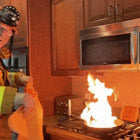 Fire
Fire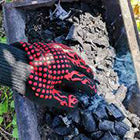 Safety
Safety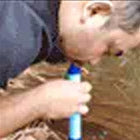 Survival
Survival Protection
Protection New
New
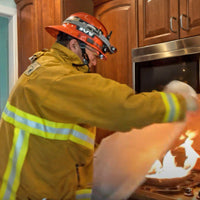 Fire
Fire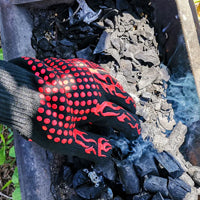 Safety
Safety Survival
Survival Protection
Protection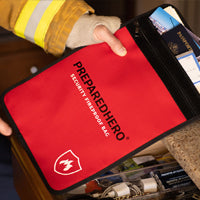 New
New





